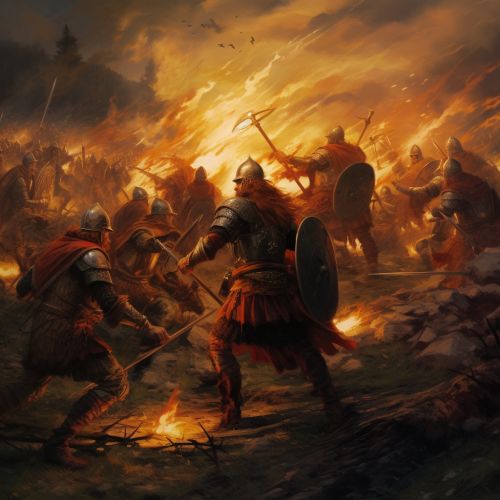Germanic heroic legend
Origins and Development
The Germanic heroic legend, also known as the Heroic Age of Germanic mythology, is a period in the mythological history of the Germanic tribes, which extends from the early 5th to the early 6th century. This era is characterized by the emergence of legendary heroes and epic tales that were passed down through oral tradition, and later recorded in various forms of literature.

The Germanic heroic legend is believed to have originated in the prehistoric times of the Germanic tribes, during the Migration Era. It was during this time that the Germanic tribes migrated from Scandinavia and Northern Germany to other parts of Europe, bringing with them their unique culture, language, and mythology. The legends that were created during this period were heavily influenced by the societal structure, religious beliefs, and historical events of the time.
Themes and Motifs
The Germanic heroic legend is characterized by several recurring themes and motifs. The most common of these is the concept of heroism, which is often portrayed through the actions of a noble warrior who performs great deeds and displays exceptional bravery. Other common themes include loyalty, honor, fate, and vengeance.
The heroes in these legends are often depicted as being of divine or noble birth, possessing superhuman strength and courage, and being guided by a strict code of honor and duty. They are often pitted against formidable enemies or monstrous creatures, and their adventures typically involve epic battles, daring quests, and tragic endings.
Notable Legends
Among the most notable of the Germanic heroic legends are the tales of Beowulf, Sigurd, and Dietrich von Bern. These legends, which have been preserved in various forms of literature, provide valuable insights into the culture, beliefs, and societal structure of the Germanic tribes during the Heroic Age.
Beowulf
The legend of Beowulf, which is preserved in the Old English epic poem of the same name, is one of the most famous examples of a Germanic heroic legend. The poem tells the story of Beowulf, a hero of the Geats, who comes to the aid of the Danish king Hrothgar by slaying the monstrous creature Grendel and his mother.
Sigurd
The legend of Sigurd, also known as Siegfried in the Nibelungenlied, is another notable example of a Germanic heroic legend. Sigurd is a legendary hero who slays the dragon Fafnir and acquires its hoard of treasure. However, his life is ultimately marked by tragedy, as he is betrayed and murdered by those he trusts.
Dietrich von Bern
The legend of Dietrich von Bern is a complex series of tales that revolve around the historical figure Theodoric the Great, who was the king of the Ostrogoths and ruler of Italy in the 6th century. In these legends, Dietrich is depicted as a noble and heroic figure who endures many trials and tribulations.
Influence and Legacy
The Germanic heroic legend has had a profound influence on the literature and culture of the Germanic-speaking world. Many of these legends have been preserved in various forms of literature, such as the Old Norse sagas, the Middle High German Nibelungenlied, and the Old English epic poem Beowulf.
These legends have also had a significant impact on modern popular culture. They have inspired numerous works of literature, film, and music, and have played a key role in the development of the fantasy genre. Furthermore, the themes and motifs of these legends continue to resonate with audiences today, reflecting universal human experiences and values.
